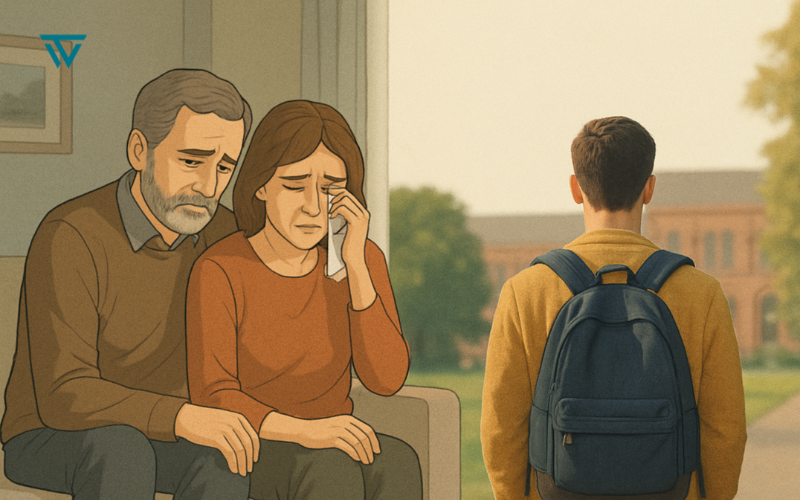Empty Nest Syndrome: Two Generations, One Truth

0 people are currently reading this article
Tarik was his parents’ first child, the apple of their eye from the moment he was born. His parents showered him with endless love and affection. Every day, they watched him grow, little by little. Each smile brought a storm of joy to their hearts. Soon, he learned to sit up, then to crawl, then to stand, and finally, to walk. Little did they know, these precious milestones would one day become cherished memories — the kind that often resurface in the quiet loneliness of Empty Nest Syndrome.
Days turned into months, and months into years. Before they knew it, their little boy was growing up right before their eyes. He was the top student in his class, and his parents dreamed of the great things he would achieve. He went from school to college, and then it was time for university. They poured their hearts and souls into helping him get into a good one. His mother spent countless sleepless nights by his side, just in case he needed to wake up to study.
Their efforts paid off. Tarik got into a fantastic university. But there was a catch—it was in another city.
His parents’ dreams were coming true, but to make it happen, they had to let him go. How could they possibly live without the child they had held so close for 20 years? He was a part of every fiber of their being. The thought alone brought tears to their eyes. The mother would cry while cooking or eating, quickly wiping her tears so her son wouldn’t see.
The day of departure arrived. Tarik packed his bags and left for campus. His parents saw him off at the station and returned to a silent, empty house. It felt like they were back to being a family of two, just as they were before he was born. But this time, it was different. Their pride and joy was now far away.
At the dining table, Tarik’s empty chair was a painful reminder. Their hearts ached, and they could barely swallow their food, wondering if their son was eating well. Walking into his room, they’d see his clothes, his books, his cricket bat—and their eyes would fill with tears once again.
Years passed. Tarik graduated, and his parents joyfully arranged his marriage. Soon after, he and his wife moved abroad for his Ph.D., and the emptiness in his parents’ home became permanent. His father kept himself busy with work, but his mother sank into a deep depression, a classic sign of Empty Nest Syndrome. She couldn’t find joy in anything. Sometimes, she would look back on her life and feel it was meaningless. Late at night, sleep would not come.
“I wonder how he’s doing,” she thought, and dialed his number.
“Son, how are you? And how is my little granddaughter? I miss her so much. Can you send me a video of her?”
Two Generations, One Reality: The Empty Nest Syndrome
Tarik’s wife, Tania, is frustrated. She feels like she constantly has to give his parents updates on their daughter, Faiza—how she is, what she’s doing, what new words she learned. “Who has the time to call every few days?” she thinks. “It’s so strange. Other people are grandparents, but why are they so obsessed? Why can’t they just live their own lives instead of interfering so much in ours?”
She feels that her in-laws need to understand that their son is a grown man with his own life and his own world. Tania vows that when her children are grown, she will never be like this with them.
This clash of perspectives is incredibly common today. When we see things from our own point of view, we always feel we are right. We might even think, just like Tania, “I will never do that when I’m older.” But is that really true? Will our perspective at 25 or 30 be the same when we’re looking through the lens of a 50- or 60-year-old?
When children grow up and move away, parents often find themselves alone again. This separation can lead to a difficult period of grief and loneliness, especially for mothers. This feeling has a name: Empty Nest Syndrome.
Imagine two birds who spent years gathering food for their babies. They still gather food, but now there are no hungry mouths waiting. The loss of that role, that purpose, is a difficult shock to overcome for those experiencing Empty Nest Syndrome.
Finding a Balance: A Path for Both Generations
As adult children, even when we are genuinely busy and can’t talk to our parents every single day, we can at least try to validate their feelings. Instead of labeling their emotions as “obsession” or “interfering,” we can try to show empathy for what they are going through with Empty Nest Syndrome. One day, we too will have an empty nest, and that same pain might come back to us.
On the other hand, for parents, navigating this transition is incredibly difficult, but it is a natural part of life. An eggshell protects a chick, but to grow, the chick must break free. If the shell holds it inside for too long, the chick will only get hurt. Human relationships are similar. We have to learn to let go when the time comes. In this act of letting go, parents can find a new sense of purpose and fulfillment.
Of course, parents should check in on their children and maintain their relationship. However, it’s important not to become overbearing parents. Our children need their own space. They have their own careers, struggles, and joys. As we said, some people find true happiness in letting go.
What they are going through today, we may go through tomorrow.